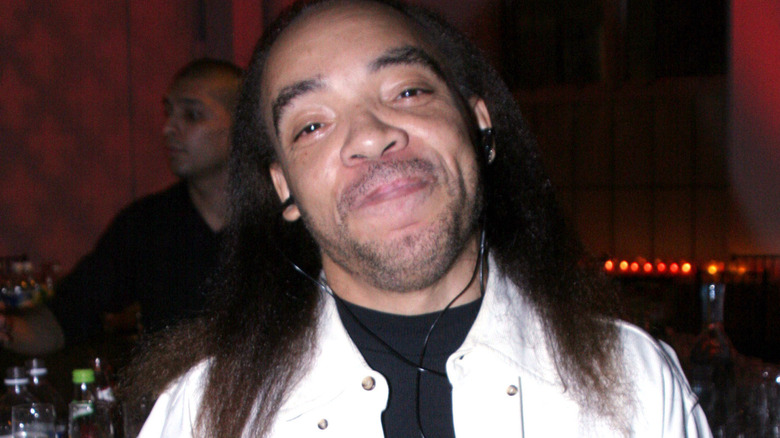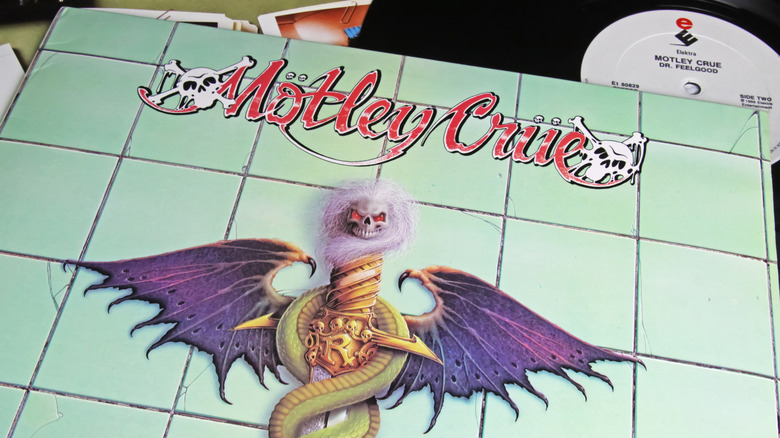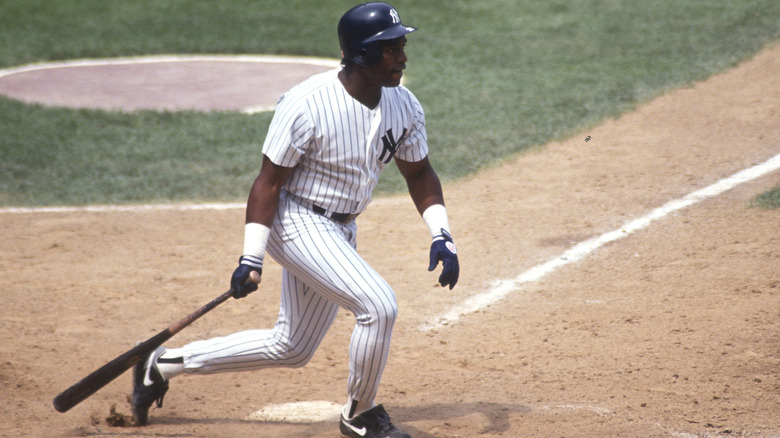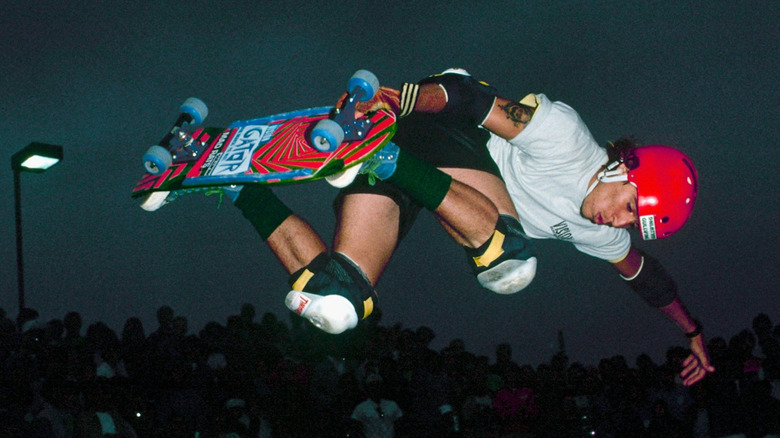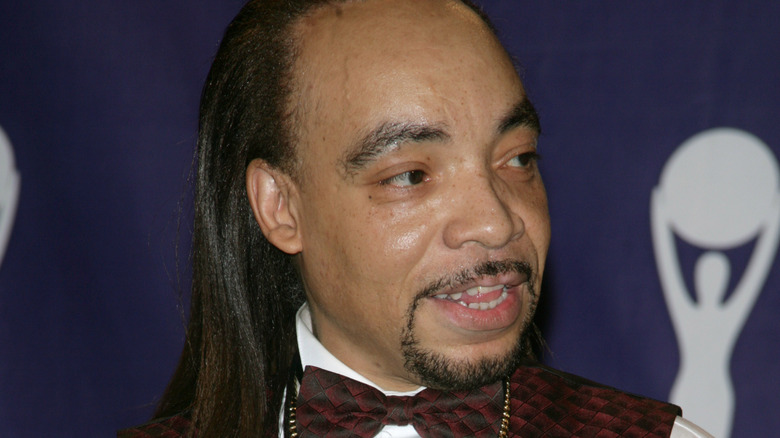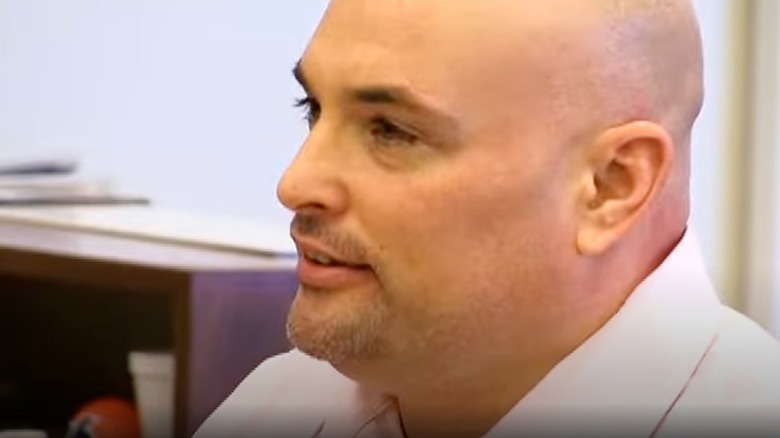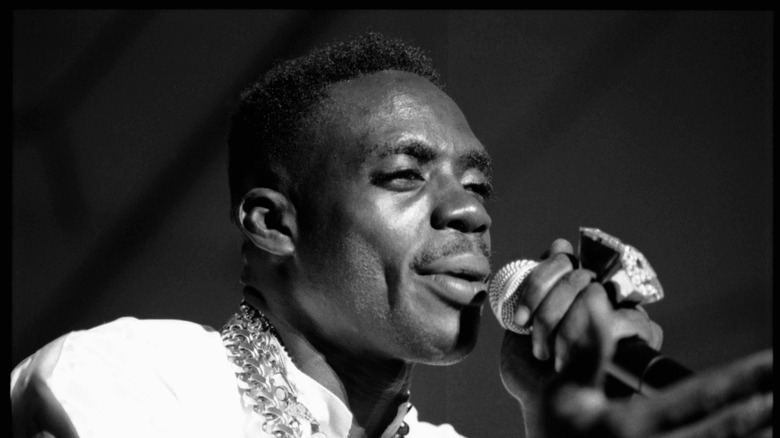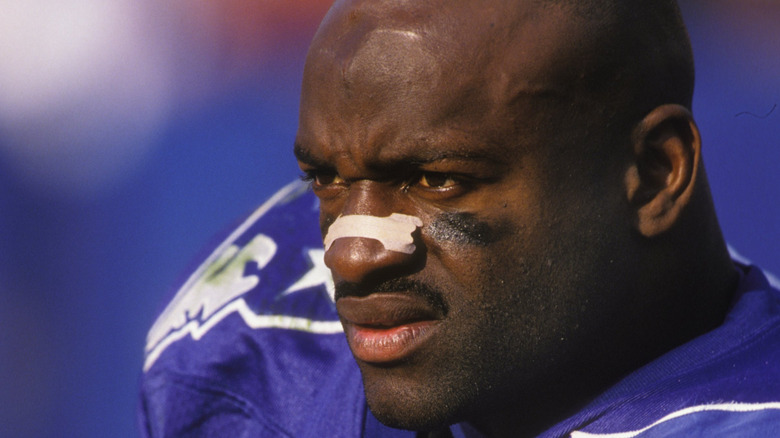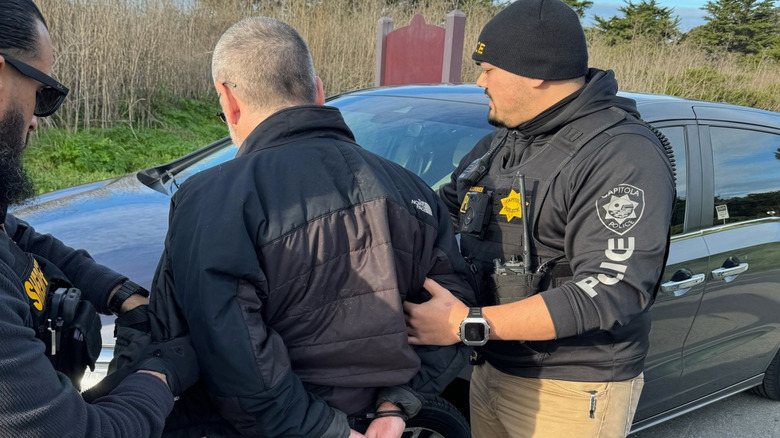'80s Stars Who Are Currently In Prison
In a world obsessed with nostalgia, the stars of the 1980s run the gamut from enduring fame to complete oblivion. A lot of our favorite musicians, actors, athletes, and socialites earned their first brush with stardom in the wild and wonderful '80s, and some make 40 years feel like a few months. Unfortunately, a lengthy prison sentence can really throw a monkey wrench into that longtime success. The stars of the '80s have had plenty of time to misbehave, get caught, and go away for ages.
Celebrity incarceration is nothing new, and fans of a performer might find themselves unhappily distancing themselves from a talented pro after hearing what they did to land themselves behind bars. Some arrests aren't as galling as others. Ozzy Osbourne spent one 1982 afternoon in a jail cell after urinating on the Cenotaph across from the Alamo in San Antonio, Texas. That outing barely belongs on a list of Osbourne's craziest stunts. He was a free man later that day, but a lot of lesser-known celebrities of the '80s are serving much longer sentences for much graver offenses. There are plenty of '80s stars who are currently in prison.
Marjorie Ann Orbin
As is often the case with high-profile prisoners, Marjorie Orbin is more famous for what landed her in prison than anything else. Orbin was a showgirl and an exotic dancer, but there's some debate over exactly how much fame she achieved. In the 2011 book "Dancing With Death," author Shanna Hogan reported that Orbin appeared in the music video for Mötley Crüe's "Girls, Girls, Girls," but that information isn't easy to confirm. Her one-time fiance, Michael J. Peter, gave Orbin her arguable high point, a role in the 1993 film "No More Dirty Deals," which he produced. Her only other on-screen appearances are in true crime documentaries.
In 2009, Orbin was convicted of murdering her husband, Jay Orbin, and sentenced to life imprisonment. Jay Orbin disappeared in September 2004 after returning from a business trip; the following month, his torso, sans head, limbs, and internal organs, was found in a plastic tub in the desert outside of Phoenix, Arizona. The most damning detail revealed in the eight-month-long trial was that Orbin had purchased a pair of plastic tubs two days after her husband's disappearance. Orbin alleges that her illicit lover, Larry Weisberg, shot her husband and that she only helped Weisberg cover up the murder. Weisberg received partial immunity for his testimony, which helped to place Orbin behind bars for life.
Mel Hall
Melvin Hall Jr. was a fixture of a few different MLB teams throughout the 1980s. He made his debut for the Chicago Cubs in 1981, but he started gaining attention in his first full season in 1983. Hall led the league's left fielders in both fielding percentage and range factor in 1987. He raked in more than $1 million dollars a year in the early 1990s, but he left the MLB for good in 1996. Hall also had a career in Japan and the minor leagues before he retired. He would enjoy his retirement for just over a decade before being held accountable for his history of nightmarish sexual assault charges, placing his actions among the worst crimes committed by MLB players.
In 2009, Hall received a 45-year prison sentence for raping a 12-year-old girl. His trial detailed a decade of Hall's horrific sexual misconduct against at least three girls, the oldest of whom was 15 when Hall started abusing her. The family of that 15-year-old girl allowed Hall to move into their home for a time. Hall often brought his victim to Yankee Stadium, happily taking the underage relationship public while promising an eventual marriage that would never come. Hall assaulted his other two victims while acting as their basketball coach. For these crimes, he was convicted of three counts of aggravated sexual assault of a child and two counts of indecency with a child. His earliest possible parole date is in 2031.
Mark Rogowski
The 1980s was an early boom period in the long history of skateboarding, allowing Mark "The Gator" Rogowski to become one of its first icons. Rogowski was only 14 when he turned pro. He won a series of high-profile competitions, turned his nickname into a very lucrative branding opportunity, and appeared in the iconic music video for Tom Petty's classic "Free Fallin." The closest comparison to Rogowski would be Tony Hawk, who consistently shared the spotlight. While Hawk remains one of the most famous athletes of his era, Rogowski didn't have the same staying power. He suffered a gruesome fall from a hotel window that arguably ended his career, then committed a heinous rape and murder that guaranteed a new kind of fame.
In 1992, Rogowski pleaded no contest to the rape and murder of his ex-girlfriend's best friend. The skateboarder made no attempt to deny the charges, instead offering several thorough and solemn apologies with references to his newfound faith. This confession allowed Rogowski to avoid a potential death sentence or a lifetime without parole. Despite the victim's father's call for harsh punishment, Rogowski received 25 years to life with the possibility of parole. That parole could have come as early as 2010, but he remains in prison. California Governor Gavin Newsom twice reversed the parole board's decision to let Rogowski out, and in November 2024, the state's parole board found Rogowski unsuitable for release.
Kidd Creole
Nathaniel Glover, aka Kidd Creole, was an early voice in the burgeoning world of hip-hop. Glover made a name for himself as one of the original members of Grandmaster Flash and the Furious Five, without whom rap music wouldn't be the same. The group released their first hit single with Sugar Hill Records in 1980 and another in 1981, establishing themselves as one of the earliest icons in the genre. Glover left the Furious Five in 1983, along with Melle Mel and the titular Flash, but the trio continued making music together for several years. Tastes changed as the rap genre developed, gradually eroding the popularity of acts like Glover's. This pushed Glover into a more modest life, working odd jobs despite his legendary status in the music industry.
In 2017, Glover killed an unhoused man with a kitchen knife. Glover readily admitted his actions on the following day, though he was unaware at the time that the stabbing was fatal. While defending his actions to the police, Glover explained that he believed the unhoused individual, 55-year-old John Jolly, was approaching him to solicit him for sex. At his trial in 2022, Glover's attorneys argued that he was in fear, but Glover was convicted of first-degree manslaughter. A month later, a judge sentenced the rapper to 16 years in prison, potentially keeping him behind bars until he's 78 years old.
Eric Naposki
NFL athletes are no strangers to heinous crimes, and while Eric Naposki isn't exactly a legend in the league, he is one of its most notorious felons. Naposki played five games in the late 1980s. He made his 1988 debut as a backup linebacker for the New England Patriots and played three times before they let him go. He came back the following year to play another game then joined the Indianapolis Colts for a single game. This short career wrapped up unceremoniously, leaving Naposki to seek out odd jobs to make ends meet.
Shortly after his NFL dreams concluded, Naposki met Nanette Packard in a gym while he was working various security gigs. Though romantically involved with a wealthy older man named Bill McLaughlin, Packard began an affair with Naposki. In 1994, McLaughlin was found shot to death at his kitchen table. The case went without an arrest for 15 years, when authorities arrested Naposki and Packard. The couple had long since split up, but both were implicated in the murder. Naposki lied to the police about owning a gun that would match McLaughlin's injuries, arguably undoing any defense he could offer. Naposki later claimed he was only a small part of the plan, which involved Packard hiring an assassin who happened to use Naposki's gun. Both Naposki and Packard are serving life sentences without the possibility of parole.
Ninjaman
Jamaican dancehall became one of the many defining musical movements of the 1980s, and one of its most charismatic voices was Desmond "Ninjaman" Ballentine. In 1988, when he was only 22, Ballentine enjoyed his first hit single with "Cover Me," a duet with Tinga Stewart. His intensity and theatricality made him an icon in the niche dancehall scene. By the late '80s, he'd earned the title "the Don Gorgon," marking him as one of the kings of the genre. He carried his hot '80s start into sustained success in the '90s, a decade that included a highly publicized feud with a fellow deejay and a brief appearance in "Third World Cop," then Jamaica's most successful action film.
Ballentine's experience in the new millennium has been far less positive. In 2017, Ballentine, his son, and a co-conspirator were convicted of shooting a man to death after an argument in Kingston, Jamaica. The deejay was initially arrested for the killing way back in 2009, but the court missed 17 projected trial dates, leaving Ballentine in and out of prison throughout. Ballentine was actually out on bail between 2012 and 2017, but he'll now have to wait at least 25 years before he's eligible for parole.
In 2023, six years into his sentence, Ballentine proposed a series of reforms to the Jamaican Department of Correctional Services. His requests for better education programs and potential work service programs were met with a measured response from the DCS, which pointed out the system's existing rehabilitative options.
David Meggett
David Meggett exploded onto the New York Giants lineup in the tail end of the 1980s. In his first season as a running back, he led the league in punt return yards, punt returns resulting in a touchdown, and the season's longest punt return. His 1989 was huge, and he parlayed that success into several massive accomplishments through the '90s. Meggett helped to bring the Giants to victory in Super Bowl XXV before transferring over to the New England Patriots for three years. He returned to New York and joined the Jets in 1998 before retiring at 32, proudly leaving the league with a then-record-breaking 3,708 punt return yards. His NFL career was truly impressive, but his activities off the field brought him a lifetime of shame.
In 2010, Meggett received a 30-year prison sentence for criminal sexual conduct and burglary. The judge convicted him of robbing and raping a college student, but Meggett's public defender alleged that the sex was consensual and announced Meggett's intention to appeal. Meggett did file an appeal in 2012, but it was unsuccessful. In the years since his sentence began, Meggett has received several disciplinary sanctions for his behavior behind bars. In 2014, 2016, and 2020, Meggett suffered a series of penalties and lost privileges as a result of his regular attempts to acquire or hide a cell phone. As of 2021, he was serving out his sentence in Allendale, South Carolina.
Jason Hoganson
Jason Hoganson isn't exactly a movie star. In fact, he's better known for his legal troubles than his single film role, but that lone performance defines a lot of his public persona. In 1987, Hoganson portrayed Pete in Ron Peck's "Empire State." The film follows an ensemble cast of English criminals engaged in a local war over an American investment scheme. Hoganson's character was a 15-year-old newcomer to the city, searching for a friend who has gone missing. The character has a short arc in the film's mess of overarching plotlines. Hoganson has no other known film or TV performances, but his brief brush with fame being a crime story seems oddly prophetic now.
Hoganson lived a difficult life that saw him alternating between living out of hostels and sleeping rough on the street since 2002. By 2024, Hoganson had racked up more than 109 criminal convictions. Early in the year, he received an 18-month prison sentence for assault, but he was released from Durham Prison (pictured) after only half that time. Hoganson became an unwilling poster boy for the English government's initiative to reduce prison overcrowding by releasing many short-term convicts. Hoganson was arrested again only two days later, facing new assault charges after allegedly slapping his girlfriend moments after arriving home. Hoganson bailed out and briefly went on the run, prompting authorities to launch a manhunt, but he was quickly found and arrested on November 6, 2024.
Dennis Roldan
Dennis Roldan started his career as a professional athlete, attaining some notoriety as a basketball player in the Philippine Basketball Association. He became an actor, probably most notably in 1983's "Hot Property," which saw Roldan take home the Metro Manila Film Award for Best Supporting Actor. He later became a politician, representing Quezon City's 3rd District from 1992 to 1995.
In 2014, Roldan received a lifetime prison sentence for his role in the kidnapping of a 3-year-old boy for ransom. Two co-conspirators were charged alongside Roldan, but both died before they could be sentenced. The athlete-actor-congressman denied the charges, but a source from a telecommunications company informed the court of incriminating messages found on Roldan's phone. Those messages involved the victim's mother pleading with Roldan, begging him to accept a smaller ransom because she couldn't afford what he demanded of her. The boy was safely recovered, and Roldan was incarcerated at the New Bilibid Prison in Muntinlupa City, where he will remain for the rest of his life.
Theo Lengyel
Theo Lengyel is not the first person fans generally think of when they hear the name "Mr. Bungle." Lengyel was one of the founding members of the experimental rock project that emerged from Eureka, California, way back in 1985. He shares that accomplishment with Mike Patton, who also provided lead vocals for Faith No More and became Anthony Kiedis' mortal enemy. Lengyel played the saxophone, keyboards, and even the clarinet for the group from their early days until 1996. Lengyel left the band citing creative differences and largely disappeared from the public eye for the following couple of decades. In 2024, he gained plenty of new attention in the worst imaginable way.
In January 2024, Lengyel was arrested in connection with the death of his girlfriend, Alice Herrmann. Authorities found her body discarded in a park and quickly suspected foul play, leading them to question Lengyel. The musician was uncooperative before his arrest. The resulting trial lasted six weeks, eventually culminating in the grand reveal of an uncovered audio recording from Herrmann's phone. The audio allegedly captured Lengyel strangling his girlfriend to death, leading to a first-degree murder conviction. In November 2024, Lengyel was sentenced to 25 years to life in prison.
Paul Sugrue
Non-English readers might struggle to identify most professional footballers, but Paul Sugrue isn't exactly at the top of the pack. Sugrue played for no less than 10 different football clubs in his 11 years in the game, drawing a total of 1,160 minutes on the field. In that period, amounting to a little more than 19 hours of playing time, Sugrue didn't score a single goal. While he was a center forward and not a striker, a career without a single goal doesn't inspire a ton of engagement from the audience. Sugrue retired in 1991, hanging up his cleats and finding a new career path elsewhere.
In 2018, Sugrue was charged alongside slightly more famous footballer Mark Aizlewood and four other men in a scheme to defraud the English government out of more than £5 million. The scam involved setting up a fake program to teach 3,800 at-risk youths to become football coaches, offering work training and a weekly stipend. Sugrue and his co-conspirators allegedly fabricated hundreds of the students on their attendance lists, taking the educational funding for themselves. Investigators labeled Aizlewood the leader of the scheme. He received six years in prison, while Sugrue got seven. All things going according to plan, Sugrue's sentence should be over in 2025.
If you or anyone you know has been a victim of sexual assault, help is available. Visit the Rape, Abuse & Incest National Network website or contact RAINN's National Helpline at 1-800-656-HOPE (4673).
